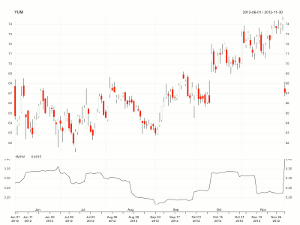Yum! Brands’ surprise guidance for a sharp decline in same-store sales in China from Q4 2011 to Q4 2012, triggered a sharp sell-off last week. Jared Woodard of CondorOptions.com offers option plays for whatever direction you believe the stock might be headed.
YUM! Brands has been regarded for some time as a play on discretionary spending in China—as part of the shift from exports to domestic consumption. Given that framing, YUM investors are pretty sensitive to changes in data coming out of China. After the market close on Thursday, YUM guided lower on Q4 sales in China. Half of the operating profit in the third quarter came from China, so a forecast for a 4% drop in same-restaurant sales is a big deal.

Fig. 1. YUM! Brands price and 1-month historical volatility, 2012-06 – 2012-11. Source: Yahoo!, Condor Options
Click
to Enlarge
On Friday, the stock fell almost 10%, giving up all of its gains since early October.
One-month option implied volatility (IV) rose 12.5%, and option volume was 670% of its average, trading almost half of the average daily total open interest. Traders were net buyers of premium with a negative directional bias—in other words, there wasn’t a contrarian tone to the activity.
The most interesting aspect of options activity on Friday was the way markets treated the price action as a one-off event. As shown in the lower panel of fig. 1, the one-month historical volatility of the stock jumped to 40% because of the day’s price drop. While option implied volatility also rose, the response was more muted. December 70 puts, which traded at about 26% implied volatility at Thursday’s close, were priced at 29.7% implied volatility to end Friday. The reaction in January options was even less extreme.
Further confirming the expectation that Monday’s price movement was a one-time adjustment, option IV skew actually declined slightly. The ratio of January 90% put IV to ATM IV on Thursday was about 1.17; on Friday, the same ratio was 1.10.
Investors may not be eager to buy shares right away: if the stock’s drop at the end of the week and month causes managers with large holdings to trim their positions, there could be more downside price action to come. Instead of buying stock at $67, traders can sell the January 62.5 puts for $0.85 and buy the 57.5 puts for $0.25 to limit downside risk. The vertical spread will make a 13% return on capital risked if the stock is at or above $62.50 at January expiration.
If positive economic data from China continues trickling in and YUM rallies in the short-term, investors can take advantage of the expected drop in IV and take profits instead of holding the position until expiration.
By Jared Woodard of CondorOptions.com


















